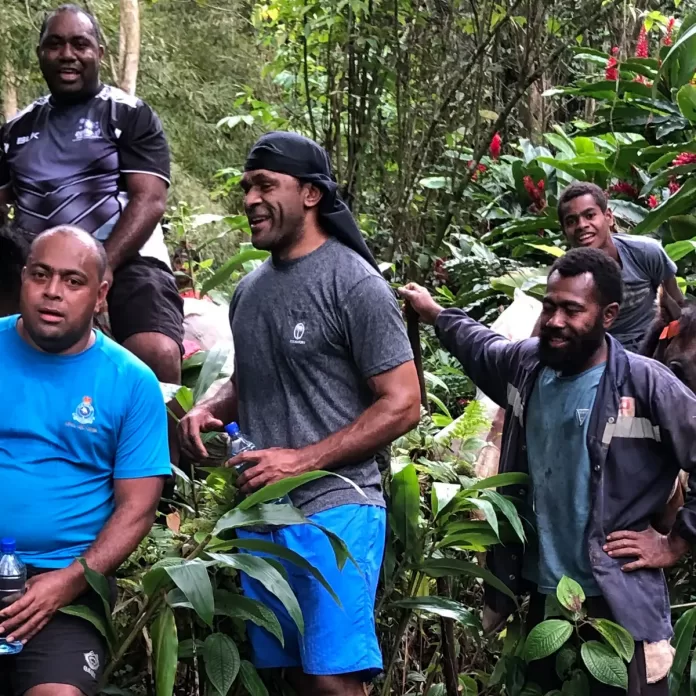To reach Nakida village in the highlands of Fiji, Dr Losalini Tabakei and her colleagues hiked for hours, up and down mountains, through forests, down muddy slopes, across rivers and along treacherous ridges with steep slopes of bamboo forest on either side.
Their supplies – clothing, medical equipment and, crucially, the Covid-19 vaccines they were bringing to administer to the remote community of just 60 people – were sent separately on horseback; the vaccines in refrigerated boxes, the rest in bags wrapped in plastic. The horses took the longer but flatter route to the town along the river.
The team, made up of Tabakei, a junior surgical consultant at CWM hospital in Fiji’s capital of Suva, as well as other surgeons, nurses, consultants, registrars, a police officer, interns and a local health worker, made the trip as part of the Fiji government’s campaign to “leave no one behind”.
The country is grappling with a devastating Delta outbreak that has seen more than 500 people die and 47,000 cases – more than 5% of the country’s population of about 900,000 people. The Pacific nation has the dubious honour of having the highest per-capita rate of infection at times over the past month.
The trip, which Nakida locals had assured them would take a maximum of three hours, took the group five hours.
“No one was mentally or physically prepared,” she said laughing, a week later, on the phone from Suva, where she has just completed rounds at the hospital. “The guides, they are not allowed to tell us how far we have to go, because according to their belief that would make the trip longer. They’d answer ‘We’re almost there’ when we were about one-tenth of the journey.”
Their trip was not made easier by the fact that they accidentally left all their snacks for the trip in the bags that were put on the horses, meaning all they had was water – and one grapefruit, which one of their team spotted, climbed a tree to pick and shared with his colleagues.
Videos of the expedition – which show the team joking and teasing one another as they went, and chanting the catchphrase “Reaching the unreachable, leaving no one behind” – were shared by the country’s health minister, Dr Ifereimi Waqainabete, as a sign of Fiji’s collective effort to vaccinate its entire community from Covid-19. The drive seems to be bearing fruit, with 95 percent of all eligible people having received one dose of the vaccine, and about 51.1 percent having received both doses.
There were just 25 people at Nakida who needed vaccinating and Tabakei says the villagers were very pleased to see the group arrive.
“They were worried about us making it safely and they had prepared a lavish dinner for us,” she says. After showers and dinner, and despite their fatigue, the medical team delivered their awareness talk about Covid-19 and the vaccine.
“They were very receptive and they were very happy to see visitors and to see that we cared enough to make that trip and reach their village,” Tabakei says.
“In the question and answer sessions they mentioned that they had already started experiencing symptoms of Covid-19 weeks back, so even in these remote villages – and we saw this all over Naitasiri – despite being removed, where there’s a track this virus will find its way. It sort of reinforced our purpose going there to educate them, vaccinate them.”
Tabakei and the other health workers visited roughly 20 villages in Naitasiri that week. The format of their visits is the same: perform cultural ceremonies, give an awareness talk about the virus, particularly addressing conspiracy theories. Then the team swab people showing symptoms of Covid, provide vaccinations for those who want them, and attend to other health concerns.
The reception to the group, and attitude to the vaccine, is entirely dependent on the attitude of the village chief to vaccination, Tabakei says. In villages where the chief is positive, 90-95 percent of villagers will be vaccinated; in villages where the chief is sceptical, that number drops to 40-50 percent.
It helps that Tabakei, whose mother is from a village bordering Naitasiri province, speaks the local dialect.
“Especially the elderly, they tend to be very reserved. They don’t always have access to information, so when they see someone from province who comes into their village and says, ‘This is good for you, this will help you’ – and we saw a few very real examples of that, just after talking to them – [people are] saying, ‘OK, I’m going to get my jab now’ and they line up to get vaccinated,” she said.
SOURCE: THE GUARDIAN/PACNEWS














